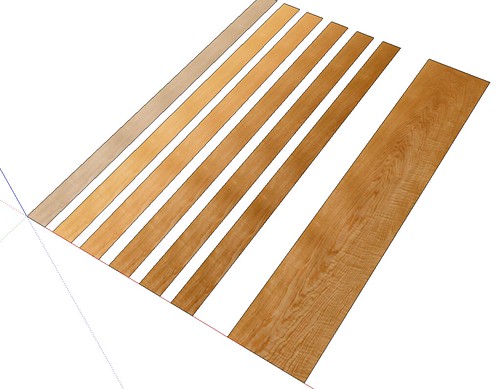Procedural Wood Texture
-
A quick way to get wood textures for small items is http://www.certainlywood.com/index.html web site. They have some good pictures if you hunt around the site and the dimensions of the veneers are in the descriptions.I save the images with my guess as to the width of the piece in the name so I can scale them. I have not tried the long pictures yet. Also a great veneer house. Sorry the pictures are not epic like Dave's.
-
jtri, it looks like they have some nice images of small sections. Might be good for small boxes.
-
Looking around the site and you can find some longer good quality picture like this one maybe 20" long. I know get the camera out! http://www.certainlywood.com/images-veneers.php?item=WENGE%201501-5
Dave when you photograph a long board say an 8' board how critical is it to be parallel to the board? What length board is the practical maximum from your experience and what lighting do you use? What are your thoughts on photographing finished vs unfinished wood to use as a material? I have found for small pieces of wood the best way to take a picture and get correct color balance is to use my flat bed scanner.
Thanks
Jeff -
Jeff,
Although you can do perspective correction in Photoshop and other editors, it is best to get the camera set up as square to the surface as possible. Also set the focal length to something longer to get away from the distortion that occurs naturally with wide angle lenses. Get the lighting as even as possible. Use a lightmeter and gray card to check illumination. I have a hand held spotmeter for that. I work with unfinished boards because I then have the option to add the "finish" in an image editor. For the finish I create a new layer in the editor and paint it with a transparent color. That color can be adjusted until I'm happy with the appearance. Sometimes I'll make three or more different stains to try out. It's easy to readjust the color and opacity of the layer after saving the image.
I made this image a while back to show some variations in stain colors.
[url=https://flic.kr/p/d9FK2d]

I've thought it would be cool to make a scanner that would scan an entire board. Seems like a project for Matthias Wandel.

-
I think there are hand held scanners that could do the job. I don't know if they're limited to standard paper sizes.
-
Yes. I was thinking about those handheld scanners. I was also thinking this would be another way I could justify a 48 x 96" CNC machine. Replace the router with a scanner head. You could scan up to a full sheet or plywood.

It wouldn't be limited to wood, either.
Three little problems. I'm not sure if normal scanner software would handle that much image area, not enough space in my shop for a machine that big (especially since I also want to build another boat in it) and there's the problem of not enough shekels in my pocket.

-
@dave r said:
Yes. I was thinking about those handheld scanners. I was also thinking this would be another way I could justify a 48 x 96" CNC machine. Replace the router with a scanner head. You could scan up to a full sheet or plywood.

Kickstarter campaign maybe?
-
We are planning on getting a new plotter/scanner for large prints at work and it will scan in color. Do you think I will get fired if I try scanning sheets of veneer?
-
You might be able to get away with it once.

-
-
-
I made this texture plugin for Thea render some time ago.
It is a three dimensional procedural wood texture so it won't require UV mapping.
Sadly procedural textures are not supported by Presto (yet).
-
That is very interesting Pixero! No need for UV map too?
Would it be able to be pushed so it would loose a bit the CG look it has?
-
Bump. To remind dave:)
Advertisement








